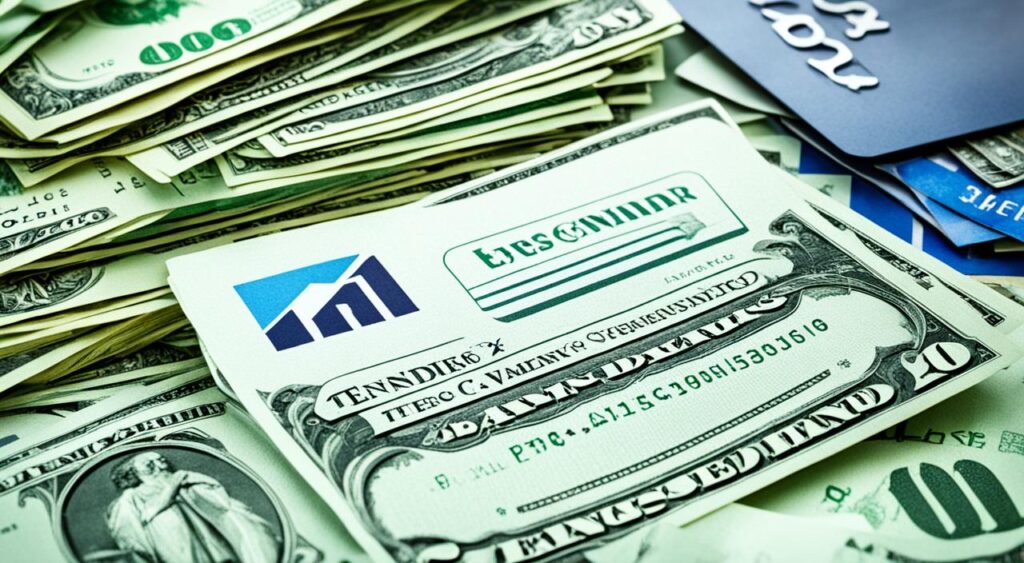Whether you’re starting a small business or growing one, choosing the right funding is key. A business loan can help you cover costs, improve cash flow, or seize new opportunities. But, picking from the many loan options out there can be tough. You need to think about your financial health, the money you need, and what different lenders offer.
Key Takeaways
- Know where you stand financially, including your credit score and debt levels, to see what loans you can get and how much.
- Figure out exactly what you need the money for, be it daily costs, one-off buys, or steps to grow your business.
- Look into different lenders, like banks, the Small Business Administration, and private loan companies, to see what they can offer.
- Think about how interest rates, APRs, and repayment plans will affect the total loan cost.
- Check if the loan needs any collateral or personal guarantees, as well as any extra fees to apply.
Understanding Your Financial Standing
Before you borrow money, knowing how lenders see your creditworthiness is key. It means you should understand two major things: your credit score and your debt-to-equity ratio.
Evaluating Your Credit Score
Your credit score matters a lot to lenders. It’s a three-digit number from 300 to 850. This number shows how risky or safe you are to give a loan. A higher score means you’re less risky and might get better loan terms.
Calculating Your Debt-to-Equity Ratio
Lenders also check your debt-to-equity ratio. This ratio compares how much your business owes with what it owns. It helps lenders see if you can handle more debt. Having less debt compared to what you own is better for loans.
Determining Your Funding Needs

Before you get a business loan, it’s key to know how much you need. Make sure you don’t borrow too little. This might not cover your startup costs or lead to extra charges.
But borrowing too much is also risky. You’ll pay more interest on a bigger loan than you need. Finding the right amount means your business plan matches your funding needs perfectly. This way, your cash flow management also works well.
Covering Shortfalls in Revenue
If your business is short on cash, a loan can help keep things running. It’s perfect for when sales slow down but will pick up again. This kind of loan is great for handling times when earnings are lower, like during certain seasons or unexpected events.
One-Time Expenses
For big costs that happen once, like upgrading equipment or renovating, a business loan is handy. It keeps your everyday money from being affected. Think about how these costs fit into your whole financial plan.
Growth-Oriented Expenditures
When you’re growing, you might need more money. This can be for hiring, opening new stores, or boosting marketing. A loan helps you make these important moves for your business.
| Funding Need | Description | Loan Amount |
|---|---|---|
| Revenue Shortfall | Temporary dip in sales or income | $50,000 – $200,000 |
| One-Time Expenses | Equipment upgrades, facility renovations, inventory restocking | $25,000 – $500,000 |
| Growth Expenditures | Hiring, new locations, marketing and advertising | $100,000 – $1,000,000 |
Researching Lenders

Once you know how much money you need, start looking into different lenders. Learn about the loan limit each one offers. Look at the approval process, lender reputation, and what customers say. You’ll check out different types of small business lending, like SBA loans and bank loans.
Loan Amount Limits
Check the most money a lender will give you. Also, see if they have a minimum you have to meet. This helps you find lenders that suit your financial needs.
Ease of Approval
Look into how each lender handles approvals. Find out what papers they need and how long it usually takes. This helps you figure out your chances of getting the money and how quickly you could get it.
Reputation and Customer Reviews
Check out what other small business owners say about the lender. Read online reviews and ask for advice. This shows you if the lender is known for treating customers well and being honest.
Considering Interest Rates and APR

When you look at business loans, knowing the interest rate and annual percentage rate (APR) is key. The interest rate is the main percentage you pay on your loan.
The APR includes any extra fees or costs, showing the true total cost of the loan.
A small change in the interest rate can greatly affect the loan’s cost. This difference is most noticeable on big loan amounts or over longer repayment terms.
For instance, the impact of a 2-point change on a $100,000 loan over 5 years isn’t much. But, on a $1 million loan over 20 years, it means paying a lot more in interest.
When choosing a business loan, don’t just focus on the interest rate.
It’s crucial to check the APR to understand the true cost from each lender. This applies to SBA loans, bank loans, or alternative lenders.
Looking at both the interest rate and APR helps you find the best loan terms for your small business.
| Lender | Loan Amount | Loan Term | Interest Rate | APR |
|---|---|---|---|---|
| ABC Bank | $150,000 | 7 years | 7.5% | 8.2% |
| XYZ Lender | $500,000 | 10 years | 6.8% | 7.4% |
| Small Business Financing | $75,000 | 5 years | 8.2% | 9.1% |
Assessing Repayment Terms
When looking at business loan choices, think about how you’ll pay back. Look at the loan duration, how often you’ll make payments, and if you can pay early. These three things are key to seeing if the loan fits your budget and cash flow.
Loan Duration
Business loan durations vary from 3 months to 10 years. The length depends on the lender, how much you borrow, and what you use the money for. Think about what you can afford each month without trouble.
Payment Schedule
Know how often you’ll need to pay back the loan. It could be monthly, every three months, or yearly. This affects how well you can plan your budget and finances. Some loans are more flexible; they might match your payment dates with when you get money from your business.
Early Repayment Options
Ask if you can pay back the loan early without extra fees. Some lenders are okay with this, but others may charge you. Being able to repay the loan early means you could end up paying less in interest. This is good for managing your debt better.
Understanding Collateral and Personal Guarantee Requirements

When you apply for a business loan, the lender might ask for collateral or a personal guarantee. Collateral is something valuable, like a building, equipment, or cars, that you give as insurance for the loan. This means if you can’t pay back the loan, the lender can take that important item from you.
Personal guarantees, however, make you directly responsible for the loan. If your business can’t pay back, the lender can come after your personal things too. This could be your house, any savings, or investments you have.
Collateral Options
For a secured business loan, you might need to offer things like real estate, equipment, or vehicles. The item you offer must be worth more than the loan itself. This way, if they must sell it to get their money back, they have more than enough value.
The lender will decide how much the offered item is worth. They then usually only lend a certain percentage of that value, which they call the loan-to-value ratio.
Personal Guarantees
If the lender thinks your business is too risky or you don’t have enough valuable things to offer, you might have to do a personal guarantee. This is serious. It means you promise to pay back the loan with your personal savings or things like your home if your business can’t.
Think very carefully before you commit to a personal guarantee. It’s a big responsibility and could affect your personal finances.
| Collateral Options | Personal Guarantees |
|---|---|
| Real estate, equipment, vehicles, and other business assets | Lender can pursue personal assets if business defaults |
| Lender assesses collateral value through appraisal | Significant personal liability for the business owner |
| Lender may only lend up to a certain percentage of the asset’s value (LTV ratio) | Often required when collateral is insufficient or business is deemed high-risk |
It’s very important to know what a lender might ask for before you borrow money for your business. The rules about collateral and guarantees are key. They could have a big effect on your business and personal life if things don’t go as planned.
Evaluating Application Fees
When you search for small business financing, it’s smart to look into the application fees, loan fees, and lender fees. These fees are part of the money needed upfront to get a business loan. They cover the cost of starting the loan, checking your credit, and checking any property you put up.
Sometimes, when you ask for an SBA loan, a bank loan, or a loan from alternative lenders, they might ask for application fees. It’s wise to check if these fees must be paid or if you might avoid them. Know that some lenders may ask for an application fee just to look at your business loan request, and this fee is usually non-refundable.
Don’t forget about lender fees for other services, like the cost of checking your credit or looking at your property’s value. These extra early costs add to the total cost of getting a loan. It’s important to keep all these costs in mind while deciding on the best small business financing for you.
| Lender Type | Application Fees | Loan Origination Fees | Credit Check Fees | Collateral Appraisal Fees |
|---|---|---|---|---|
| SBA Loans | $0 – $500 | 0% – 3.5% | $0 – $50 | $0 – $500 |
| Bank Loans | $0 – $1,000 | 0% – 5% | $0 – $100 | $0 – $1,000 |
| Alternative Lenders | $0 – $500 | 2% – 10% | $0 – $100 | $0 – $500 |
To choose wisely, fully learn about the application fees, loan fees, and all the starting costs of different small business financing options. This helps you make a decision that fits your spending plan and financial goals.
Business Loan
Looking for the right business loan is key for your small business. It’s important to compare your options like interest rates, fees repayment schedules, and any collateral or personal guarantee requirements. This step will show you the true cost of borrowing and if the loan fits your cash flow analysis and financing needs
Comparing Loan Options
First look at the loan terms from SBA loans, bank loans, and alternative lenders. Pay attention to things like the loan amount, interest rates, and repayment periods. Also, don’t forget to check for upfront fees or prepayment penalties.
Calculating Projected Costs
When checking loans, make sure to look at the total cost of borrowing carefully. This means looking at the principal, interest rates, and fees. Knowing all the costs upfront helps make a smart choice for your business’s cash flow analysis and financing options.
Applying for a Business Loan
Now, it’s time to apply for a business loan. Start with your top choice lender after you’ve done your homework. If you like what they offer, finish the application process. If not, then try again with your next best option.
Completing the Application Process
To get a business loan, you’ll need to share a lot of financial and operational info. This includes your financial statements, a solid business plan, and some facts about your business. For example, how long you’ve been around, your income, and credit check details.
No matter the loan type – SBA loans, bank loans, or alternative lenders – you’ll probably face a detailed underwriting process. Be ready to give more info about your business and prove you’re in good financial shape.
It’s important to be thorough when applying. This boosts your chances of getting the loan. A well-prepared business loan application helps your small business move forward.
Also Read: how to get a startup business loan with no money
Conclusion
Choosing the right business loan for your small business is crucial. You must consider your financial situation, how much funding you need, and do your research on lenders. By using the steps in this guide, you’ll find a loan that helps your company grow.
Start by looking at your credit score and how much debt you have compared to your assets. Then think about how much money you need and check out different lenders. This guide gives you all you need to know to make a smart choice.
It’s key to understand the loan’s interest and how you’ll pay it back. Think about what you can use as collateral. Also, know the fees for applying. This way, you can pick a loan that fits your business’s goals and your budget.
Whether it’s an SBA loan, a bank’s offer, or a different choice, this guide prepares you to pick well. Take your time to review your finances, funding needs, and different lenders’ terms. Doing this helps ensure you get the right loan to support your business’s future.
FAQs
Q: What factors should I consider when choosing a small business loan?
A: When choosing a small business loan, consider factors such as the loan term, interest rates, eligibility requirements, and whether the loan meets your business needs.
Q: How can a small business loan benefit my business?
A: A small business loan can provide the necessary financing to help small businesses grow, expand, cover expenses, or take advantage of new opportunities.
Q: What is the difference between a term loan and a business line of credit?
A: A term loan provides a lump sum of money upfront with a fixed repayment schedule, while a business line of credit allows you to borrow funds as needed up to a predetermined limit.
Q: What are the eligibility requirements for obtaining a small business loan?
A: Eligibility requirements for small business loans may vary but commonly include factors such as credit history, years in business, and the type of business.
Q: How can I determine the best small business loans for my business?
A: To determine the best small business loans, consider factors such as interest rates, loan terms, fees, and whether the loan aligns with your business needs and goals.
Q: Can small businesses get loans from government agencies?
A: Yes, small businesses can get loans from government agencies such as the Small Business Administration (SBA) or women’s business centers that provide loan programs specifically designed to help small businesses.
Q: How do I apply for a small business loan?
A: To apply for a small business loan, gather necessary documentation, such as business financial statements and tax returns, and submit an application to a lender or financial institution.




